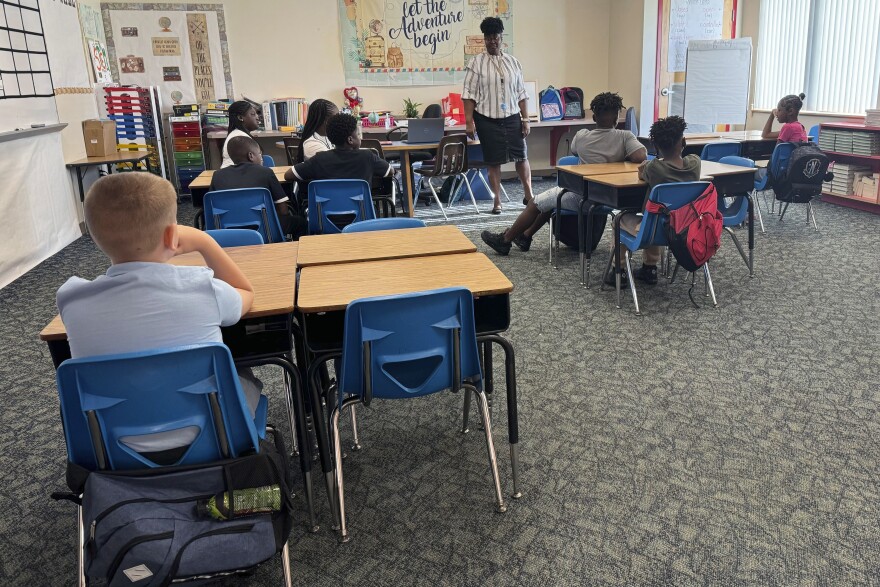The state Board of Education on Thursday approved new social studies standards for how the history of communism is taught to Florida middle and high school students — and the adoption of a framework put forth by the controversial conservative think tank The Heritage Foundation.
The updated curriculum widens instruction to cover lessons on the regimes of Cuba and Venezuela, as well as China and the former Soviet Union.
"These new standards will ensure that our students learn about the dangers and the lasting consequences of communism," said Paul Burns, senior chancellor at the department. He added that the aim was for students have a better grasp on suppressed freedoms, abuse of power and suffering across the world at the hands of communism.
It comes after Gov. Ron DeSantis signed a bill into law last year requiring the history of communism be taught in public schools. It also follows the Republican-controlled Legislature's designation of Nov. 7 as Victims of Communism Day in Florida's public schools, to include at least 45 minutes of instruction on figures like Mao Zedong and Fidel Castro.
The new standards the board voted for on Thursday offer a deeper analysis of the topic, guidelines for specific courses, material for students with special needs and paves the way to find textbooks that are "aligned" with the curriculum, according to Burns.
" It is our responsibility to make sure future generations can thrive and they learn how to think, not what to think — and that is exactly what this does," said board member Layla Collins, who is married to Lieutenant Gov. Jay Collins, "because as you've heard from our friends — whether it's our friends from Vietnam, Venezuela, or Cuba — once socialism and communism take hold... there is no more thinking for yourself and it is our responsibility to preserve that."
Eduardo Gamarra, a politics and international relations professor at Florida International University, said the state has gone too far in outlining how communism gets taught.
" I don't think students are that stupid for me to have to tell them that communism is bad, for them to figure it out by themselves by the evidence," he said, "but what they're doing is they're essentially creating an ideology, an official handbook, from which we have to teach."
READ MORE: What to know about how Florida will teach McCarthyism and the Cold War
The curriculum differs slightly between middle and high school. For seventh graders, for example, material goes over advantages of capitalism and the free market, and "censorship to restrict free speech, the press, political dissent, and religious expression."
Instruction for high schoolers goes deeper, delving into geopolitics around the world. In looking at South America, some of the points are analyzing Cuba’s social, political and economic landscape and "the surge of radical socialist thought in Venezuela."
Opinions about adopting the curriculum were split among the public. Some favored its adoption, telling anecdotes of what it was like to grow up in Vietnam's regime. Others, including some retired educators, felt the proposal went too far in telling what students should be thinking about communism and socialism.
Specific areas of study would also touch on political volatility during the Cold War, when McCarthyism and the Red Scare prompted the firing of thousands of government employees, often based on unprompted accusations of being communists. It intensified political divide, with those deemed to be political enemies losing jobs and being threatened.
The high school curriculum also will also go over methods used by the Communist Party of America to spread influence, including "the recruitment of prominent individuals to spread propaganda" such as actress Jane Fonda, who last month revived an activist group from the Cold War era standing against censorship in media.
Framework on teaching good vs. evil
At the same meeting, the board also unanimously voted to make Florida the first state to adopt the Phoenix Declaration, a playbook for education objectives that includes teaching students "that good and evil exist."
'The Phoenix Declaration: An American Vision for Education' is a set of guiding principles created by the ultra-conservative Heritage Foundation think tank, which also put forth Project 2025, a policy roadmap for Republican leadership that has concerned progressive leaders, scholars and citizens.
Principles outlined in the declaration include parental choice and responsibility, truth and goodness, and cultural transmission.
The declaration is not a law, as the board doesn't have the power to pass legislation, but education commissioner Anastasios Kamoutsas said the frameworks is about publicly affirming the guiding principles the board operates under.
READ MORE: DeSantis pick named Commissioner of Education — again
“For too long, education freedom advocates have been on defense, constantly reacting to the radical Left’s latest ideological assault,” said Heritage Foundation President Dr. Kevin Roberts on the declaration's website. “It’s time to go on offense. School leaders, educators, school board members, and policymakers need a set of shared, unshakable principles to reclaim education and put students — not leftist activism — first.”
Kamoutsas also spoke about playing offense when it comes to battling topics such as sexual orientation, gender identity, critical critical race theory and DEI.






